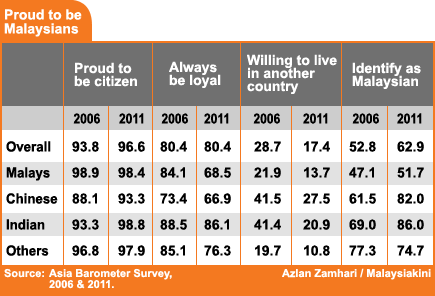By Bridget Welsh
Sep 6, 2012 | Malaysiakini
Malaysians celebrated 55 years of independence on Aug 31. Most did so the usual Malaysian way – with family and friends, along with good food and great friendship.
Despite high levels of political anxiety, angst and uncertainty, there is much to celebrate. Malaysia is a great country, with a proud history and warm wonderful people.
I celebrated the event in Ipoh, where Perakians showed me the fine hospitality of good cheer and company. It is clearly evident that Malaysia’s finest assets are its people.
Najib and Muhyiddin at a rally to celebrate country’s 55th Independence Day in Bukit Jalil StadiumThis year’s Merdeka was markedly different, however. The event became highly politicised, as both sides of the political divide used the occasion to woo supporters. The use of government resources for logos, songs and political slogans and politicking during the official celebration with Umno-like political speeches does not reflect well on the governing coalition.
The sagas around the preparation for Merdeka raised serious questions of credibility. Rather than embrace all Malaysians, the mode was one of “by invitation only” which at its core violated the spirit of marking independence.
There was a deficit of statesmanship. This highlights one of the most serious issues Umno is facing nationally – that it is seen to serve only the chosen few rather than the broader community.
At the same time, the yellow-shirt civil society’s ‘Janji Demokrasi’ (Promise of Democracy) gathering mirrored the polarising politics now present in the country, with a show of continued resilience among the Bersih movement in its campaign for a cleaner electoral system.
While the intention to bring together Malaysians was more evident – and the festival spirit of the event telling – the tactics adopted by a few to denigrate others by stomping on pictures and flying alternative flags – even if from questionable sources – allowed the government to undermine the event’s overall impact.
Prouder to be Malaysians
The temptation to use this event in the increasingly high-stakes politics was just too attractive to resist. The reason is simple – Malaysians are deeply proud of their country – and politicians wanted to exploit this.
Despite all the political noise, the angry comments on websites, the negative attacks and underlying concerns, the love of Malaysia has been growing.
Survey results from two different periods (2006 and 2011) as part of the region-wide cross-national Asia Barometer Survey show that Malaysians are overwhelming committed to their country; they are proud to be citizens and believe in being always loyal, as shown in the table.

Recent data shows that 97 percent of Malaysians are proud to be Malaysians – this says something. It is among the highest in the region. The trend among all ethnic groups is towards stronger national identity, with markedly more people identifying themselves as “Malaysians”.
While there are ethnic differences – understandably tied to feelings of exclusion and concerns about equality – these pale in comparison to the overall trend towards a stronger Malaysian nationalism.
The data also shows that fewer Malaysians are willing to live abroad, with a sizeable drop over the last five years. The temptation for better economic opportunities remains present, however, highlighting concerns about opportunities and quality livelihoods.
That said, more Malaysians across races are simultaneously identifying themselves as “Malaysian”. In the Malay community, the “Muslim” and “Malay” markers persist, but the shifts among the other communities is marked and telling.
Noteworthy, a majority of Malays prioritise the Malaysian identity. This places a challenge on any leader who does not see himself as Malaysian first, even among the Malay community. Malaysian nationalism is alive and well, and growing stronger.
Stronger embrace of democracy
The interesting question is why? Some would point to PM Najib Razak’s 1Malaysia concept. Despite its constant misuse for partisan campaigning and market branding, the idea in a nutshell involves a sense of place for everyone in Malaysia.
This dream – like Malaysia’s push for a common Vision 2020 for all – gives people a sense of belonging and hope. But few in the survey pointed to 1Malaysia directly as a success.
Another more substantiated part of the story comes from the greater gains made for non-Malays in Parliament and a greater sense of inclusion in the governing process of many opposition governments, whether in Selangor, Penang, (briefly in) Perak or Kedah, to name a few.
The overall findings of the data show a stronger embrace of democracy and high support for more inclusive representation. This sense of all communities having a place at the table – from Sabah and Sarawak to the different ethnic groups – is a true test of the leaders’ ability to represent them nationally.
The struggle BN faces to be seen as multi-ethnic are real with Umno’s overwhelming dominance and weakening non-Malay representation, as are the challenges Pakatan Rakyat faces in assuring that all the voices are represented and accommodated.
The dynamic is not about representing one group, however, but the country – even at the expense of politics and especially at the expense of personal interest.
The coalition and leaders that are seen to be doing this best – to be inclusive of all Malaysians with the promise of hope and belonging and seen to put the country as a whole first – have the advantage electorally.
Part of this is putting aside politics and genuinely celebrating each other. For at their core, Malaysians are Malaysians – and proud to be so.